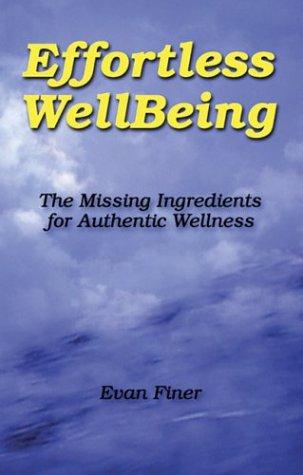 Of all the meditation approaches I’ve experienced and studied, the one I keep coming back to in the end is a little out-of-the-mainstream book called Effortless Wellbeing by Evan Finer.
Of all the meditation approaches I’ve experienced and studied, the one I keep coming back to in the end is a little out-of-the-mainstream book called Effortless Wellbeing by Evan Finer.
Evan set out to discover and distill the essential elements of meditation that can affect our everyday sense of wellbeing. Eventually he boiled it all down to three key skills, which can then be used in a rich variety of ways, tailored to you individual needs.
He has systematically removed anything that he doesn’t think is essential. So this book is not about yoga or zen or vipasanna or any other specific “denomination” of meditation. But it is consistent with them all, since there are several simple common elements that make them all work:
1) Relaxing the body,
2) Learning to breathe smoothly and naturally, and
3) Calming the mind by learning to focus.
It’s this last skill, learning to focus, where the variety of meditation lies, and where meditation becomes a rich source of everyday wellbeing (not that the author treats the other two, relaxing and breathing, lightly). For, as it says in the Yoga Sutra itself , once you learn to focus the mind, it can be focused on anything you choose.
Evan talks about a number of specific kinds of meditation. But there are few things in life which cannot be enhanced by relaxing your body, breathing more naturally, and gently focusing your mind.
In short, anything can be turned into meditation. Meditation can be not only something you go off and do as a separate practice, but something that can permeate your everyday life and create “Effortless Wellbeing”.
Beyond this, each person’s approach will vary. In my case I like to remind myself of the following variations (this is my personal list, not Evan’s), each of which starts with relaxing the body, breathing naturally and smoothly, and focusing on:
1. The simple in and out of the breath itself.
2. A mantra. I happen to prefer A simple Sanskrit mantra, but Evan feels any words will do, since it’s the focus that makes it work, not the words themselves.
3. A single object. This is the traditional method of the Yoga Sutra, whereby one can become as one with any object. A less obvious example–I focus entirely and exclusively on the ball when I play tennis, which turns it into an hour an a half of moving meditation.
4. A scan of the body or other body focus. This is the method used by Buddhist whole-body vipasanna meditation and yoga nidra. Chakra meditation also falls into this category.
5. A concept or idea or feeling. It could be passage or principle from an ancient text, or a koan, or a wish, like loving-kindness or world peace, etc. (This is a broad category that includes many variations.)
6. The details of performing a specific task. This extends meditation to virtually anything–driving a car, cooking a meal, solving a problem, weeding the garden, washing the dishes, conducting a meeting, playing guitar, doing yoga poses. Anything you do can be enhanced by treating it as an opportunity for meditative focus.
7. What I like to call ultra-awareness, whereby you tune in more acutely to specific sounds or sights or sensations or emotions. Maybe it means noticing the shape of the clouds or the color of the trees or the distant sound of cars on the freeway, just paying close attention to some detail of daily experience you are usually oblvious to.
8. Visualization. Picture yourself on a beach in the Caribbean, or looking out from the peak of your favorite mountain. Relive an enjoyable mood or feeling you’ve had in the past simply by closing your eyes and imagining it.
9. Relaxed, non-judgemental focus on the present moment–whatever happens to be going on right now, at this moment, no matter what it is.
As you can see, this is meditation as everyday life, even though meditation as a separate practice is still certainly very important, too. Evan Finer calls this broad-based approach to meditation Effortless Wellbeing.
If this sounds intriguing to you, get the book. You’ll love it.






Read 15 comments and reply